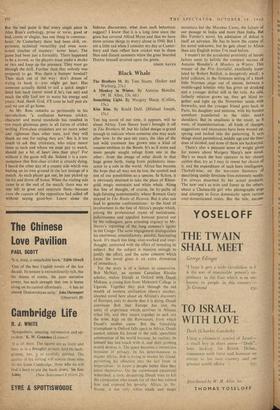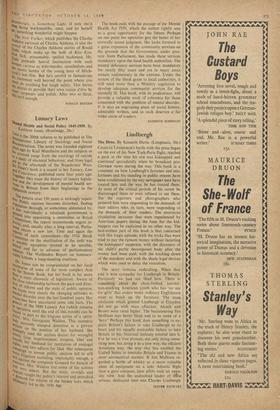Black Whale
Kiss Kiss. By Roald Dahl. (Michael Joseph, I5s.)
THE big novel of our time, it appears, will be about Africa. Tom Stacey hasn't brought it off in The Brothers M, but his failed design is grand enough to indicate where someone else may scale after him. In the past ten years, the idea of the last wild continent has grown into a kind of counter-emblem to the Bomb. It's as if more and more people sought refuge from one in the other : from the image of solar death in that huge green birth, rising from prehistoric inno- cence to a role in the world. Africa has become the hope that all may not be lost, the symbol and test of our possibilities as a species. In fiction, it is obviously destined to take the place of Rhine- gold, magic mountain and white whale. Along this line of thought, of course, lie by-paths of high-faluting sentimentality where Romain Gary strayed in The Roots of Heaven. But it also can lead to genuine confrontations: to the kind of involvement in the fate of Africa's people which, among the professional reams of melodrama, judiciousness and appalled humour poured out by his colleagues, gave arresting urgency to Mr. Stacey's reporting of the long summer's agony in the Congo. The same engagement distinguishes his enormous, unsatisfactory, painful, fascinating book. It's much too long, over-worked and over- thought; contorted with the effort of investing its subject. But the subject is massive enough to justify the effort, and the same concern which knots the novel gives it an extra dimension of immediacy.
Yet the story is of a failure in connection. Bob McNair, an earnest Canadian Rhodes scholar, makes friends at Oxford with Daudi Mukasa, a young lion from Makerere College in Uganda. Together they pick through the old wealth of western civilisation (there's another, aborted novel here about an African's discovery of Europe), only to decide that it is dying. Daudi convinces Bob that Europe has lost, the unity of experience which survives in African tribal life, and they return together to seek out the tribe, high on the Ruwenzori, from which Daudi's mother came. But the friendship triumphant in Oxford falls apart in Africa. Daudi cannot initiate his friend in the rich, speechless communion of his world because. he realises, he himself has lost touch with it. and their probing would destroy it. The quest becomes a monstrous invasion of privacy. In his determination to master Africa. Bob is trying to master his friend. perverting his affection into the last form of imperialism : to know a people better than they know themselves. On the snowbound equatorial watershed. a torn, despairing Daudi tries to kill the companion who stands for all that has robbed him and exposed his poverty. Africa, to Mr. Stacey, is not only white whale and magic
mountain but the Marabar Caves, the failure of our passage to India and more than India. But like Forster's novel, his admission of defeat is itself an advance. He has to leave the centre of his novel unknown, but he gets closer to Africa than any English writer I've read before.
I mustn't let the accidental proximity of heroic failure seem to belittle the compact success of Antoine Blondin's A Monkey in Winter. This winner of the Prix Interallie, excellently trans- lated by Robert Baldick, is deceptively small : a brief collision, in the Simenon setting of a bleak little Norman plage out of season, between a middle-aged hotelier who has given up drinking and a younger drifter still in the toils. An odd. fatherly relation grows up, they get blind to- gether and light up the November sands with fireworks, and the younger friend goes back to Paris, his daughter and mistress, with his burden somehow transferred to the older man's shoulders. But its smallness is the result, as it were, of transistorisation: all kinds of charges, suggestions and resonances have been wound up, sprung and tucked into the patterning. It says things about parenthood, middle age and the free- dom Of alcohol, and none of them are hackneyed.
There's also a pleasant sense of weight given for money about Margery Sharp's new novel. She's so much the best operator in her chosen calibre that, try as I may to resent her choice of it, and the expenditure of such keen intelligence, Thirkell-wise, on the tea-room humours of describing untidy feminine lives extremely neatly, I'm always disarmed by her actual products. The new one's as trim and funny as the others, about a Chelsea-ish girl' who photographs dogs and attempts to force domesticity upon various over-domesticated males. But the title, uncoil?'
Prornisingiy, is Something 'Light. If only she'd stop being workmanlike, once, and let herself go, something wonderful might happen. , The New Yorker, which publishes the Charles 'Adams cartoons of Charles Addams, is also the st7aree of the Charles Addams stories of Roald Ohl, which make up the bulk of Kiss Kiss. Sick Sick, presumably, spelled backward. Mr. Kahl pretends horrid fascination with such humanh curiosa as wife-murder, cannibalism and the exotic hobby of the young hero of Hitch- ,a.ck's last film. But he's careful to fantasticate as treatment well beyond the point ,wherc you need do anything but laugh safely. This leaves the stories to provide their own raison d'etre by th9er. carpentry and polish. After two or three. 's Isn't enough.
RONALD BRYDEN







































 Previous page
Previous page